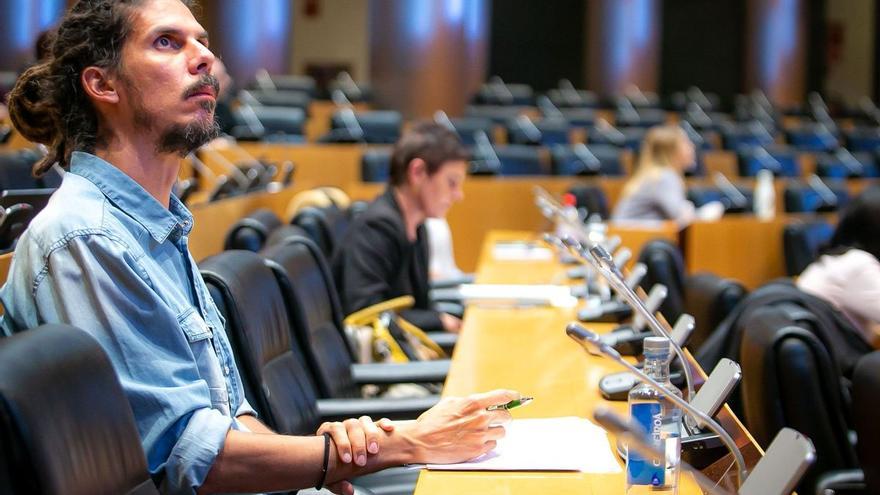
The former deputy of Can Alberto Rodriguez has launched this Monday his political project Drago to stand for municipal and regional elections on May 28 in the islands Canary Islands. People of the highest confidence of the second vice-president of the Government, Yolanda Diazin what is interpreted as a show of public support.
The former purple Secretary of Organization left the formation after losing his seat, a year ago now, and already in June he expressed his intention to present to elections through a “Canarian obedience” platform, as described this Monday. The name, Drago, is the name of a centenary tree in Tenerife, and represents the spirit that the former deputy aspires to represent. The launch occurs when Rodríguez is still waiting for the constitutional Court rule on the return of his seat.
According to The Newspaper of Spainfrom the Prensa Ibérica group, the leader also opened up to start a dialogue with Yolanda Díaz to reach an understanding for the general elections, which gives special relevance to the fact that the presentation of Alberto Rodríguez’s project was attended by the Senior Parliamentary Advisor to the Second Vice PresidentHector Moran. In Podemos, on the other hand, they were not aware that their former Secretary of Organization was going to launch their platform on Monday.
In June, Rodríguez granted an interview to Radio Club Tenerife in which he admitted feeling “disappointed” with the formation, to which accused of having “attempted to silence” his case, which continues in court, awaiting a ruling by the Constitutional Court.
Rodríguez announced then that he would work for a new purely Canarian political formation. “There is social, political and electoral space for a force of Canarian obedience and of a popular character”, defended the former deputy, who advocated building a “wide and diverse space that responds to the social majority”.
The former number three of Podemos advanced that the construction of the party “is a collective process” and has open to dialogue with Yolanda Díaz ahead of his future candidacy for the general elections. “If Yolanda Díaz comes and she wants to sit down and talk face to face with a 100% Canarian space where decisions are made here (…), we will be delighted, we will not have any problems”. The leader has also insisted that “the meaning of the votes, the resources and the loudspeakers have to be from the Canary Islands”; and only in this way would he open himself to converge with other forces. “There are chances that this will be very, very big and that it will add a lot of people“Rodríguez has defended, using the verb ‘add’ already used by the second vice president.
The leader has advanced the two pillars of the project; The first of them will pivot on mobilization, taking into account the high level of abstention that usually takes place in the Canary Islands. “In many municipalities there is more than 50% abstention“warned Rodríguez, who assured that “if we want to change the productive model of the islands, we have to get the participation of that 50% of the archipelago and give these people that illusion, an opportunity to make them want to participate and vote” .
Another of the axes of the project will be to reverse the situation of dependence on foreign countries, since “climate change or the increase in kerosene will affect the Canary Islands”, to the extent that the prices of flights to the islands will rise and the general increase in the cost of life.
Criticism of Podemos
The leader has criticized Podemos in relation to its functioning at the state level due to the centralism of the organization that he himself directed, because “our voice was not heard“and” there will always be a more important issue in the capital than talking about the islands “. In addition, he has made reference to his judicial situation and has admitted feeling “disappointed” with his previous party. “All this surprises me for the worse” , Rodríguez pointed out, censoring the performance of Podemos, “trying to cover this issuetrying to force him to occupy the seat to avoid a judicial fight (…)”.
The truth is that since Rodríguez’s seat was left empty, Podemos has tried to cover it up to ensure more room for government votes, but so far the candidates who are responsible for collecting the minutes have avoided doing so, leaving United We Can with one vote less and generating tensions in the Congress of Deputies.
Alberto Rodríguez took advantage of the interview to charge straight into the purple dome, separating it from its social base, from which it does say that it has received encouragement in the streets: “One feels disappointed and surprised by the people who are very high up, although the support of the bases of the organizations is total,” he defended. He also pointed out that “if it had been another case”, referring to other more prominent leaders of Podemos, “much more would have been fought -within the party- for me to continue in the seat. The reality is that it has not been done and mute attempted“.
Too a attacked the management of Podemos within the coalition government in the Canary Islands. “It seems that the same people continue to govern,” said Rodríguez, who pointed out that “the feeling is that things are not done in another way” with the party in the regional executive. The leader has also not been spared criticism of the operation of his former party, because “when you don’t have the decision-making space here but 2,000 km away, people perceive it clearly”.
















